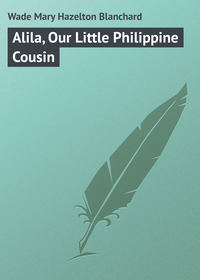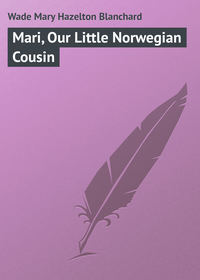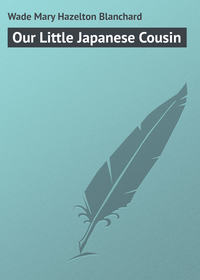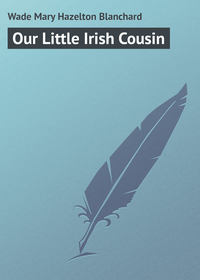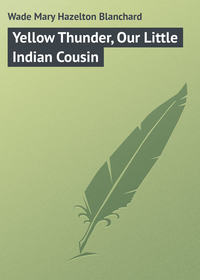 полная версия
полная версияOur Little Eskimo Cousin
CHAPTER IV.
DOG TEAM AND SLEDGE
When he was three years old, our little northern cousin had his first and only pets. They were two little puppies left without any mother. They looked like baby wolves with their sharp, pointed noses, erect ears, and furry backs; but they were very cunning, and amused their little master all day long. When night came they crept under the heavy covers, and lay close to Etu's feet while he slept, keeping him as warm and comfortable as he could possibly desire to be.
But, like all other pets, these puppies would grow up, and then their work in life began as well as Etu's. They must be trained to draw a sledge, for they must be able to carry their young master on long journeys over the snowy plains.
Etu's mother made him some reins to be fastened to the dogs' necks. She placed the ends in the hands of her little boy, who sat on the platform, holding a whip. He must learn to manage the team, he must teach the dogs to obey his voice, to move to the right or the left, as he directed; in short, to understand that he was truly their master.
Every new birthday two more dogs were given to Etu, and it became his duty to feed and train them to be in readiness when he was old enough to hunt with his father.
Do not imagine for a moment that this was an easy matter. No white man has ever yet, I believe, found himself able to manage a pack of Eskimo dogs. Each one is fastened to the sledge by a single cord, and, as they hurry onward at the sound of their master's voice, it seems as though there were the most dreadful confusion. One dog, wiser and cleverer than the rest, is always chosen as the leader; his rein is a little longer than the others. He is always the one that listens most closely to the directions given, turning his head backward from time to time to look at his master, and make sure that he is right. Then onward he dashes, the other dogs following close at his heels.
Etu spent some time in deciding which dog was the best out of his own pack, but when he was quite sure of Vanya's strength and brightness he gave him the greatest care and attention of all.
But the whip! It was far harder to learn its use than to master all his other lessons. The handle was only six inches long, while the lash was at least sixteen feet. To throw it out and then bring it back without letting it become entangled among the legs of two or three dogs was a difficult task. But to be sure of striking only the one for whom it was intended, was a far harder thing to learn. Even when Etu had become quite skilful, it seemed as though every time he rode away he must come home with at least one broken bone. For as the dogs gradually gained in speed, and one or another received a stroke of the whip to remind him of his duty, he would jump wildly around. Perhaps he would upset two or three others in an instant. Then there would be such a yelping, and such a breaking of reins would follow, it seemed impossible for Etu to straighten them out again, and harder still it must have been for him to keep his seat, and not be thrown off.
But the boy loves the work, and nothing pleases him more than to be sent twenty miles to a neighbouring village on an errand for his father.
In the winter season, when the dogs are not working, they are sometimes allowed to stay in the passageway leading to the house. And you already know that they try again and again to make their way inside. The burning lamp gives such pleasant warmth, and the smell of the seal or reindeer meat is so tempting that they are willing to run the chance of the blows they are almost sure to get for being so daring.
They are warmly clothed, however, and can bear the most terrible weather without harm coming to them. Beneath the long hair a heavy soft wool grows in the winter time, and protects their bodies from the icy cold.
It is Etu's duty to feed all the dogs of the household. It does not take a great amount of his time, for the poor hard-working creatures have only one meal in two days! If there is danger of a famine, and provisions are scarce, they are fed but once in three days. This is during the winter, moreover, for in summer they are expected to provide for themselves, getting fish from the shallow beds of the rivers, killing birds as they alight on the shore, catching baby seals, and getting reindeer moss or lichens from the rocks.
It is fun to watch Etu on feeding day. He gathers the dogs around him in a wide circle, and tosses first to one, then to another, his strip of sealskin. If a dog moves from his place or jumps out of turn to receive his food, he is only rewarded by a lash of the whip, instead of the longed-for meat. So by long experience they have learned to wait patiently.
These Eskimo dogs must have wonderful stomachs to digest the tough food on which they live. It is simply impossible to chew the strips of skin, so they are swallowed whole. Sometimes a young dog chokes over his hard work, and coughs up his precious bit, only to have it snatched away from him by one of his neighbours.
We feel like pitying these dogs of the cold lands. They are deeply devoted to their masters, yet a word of kindness is rarely spoken to them. Their work is hard, and their food is scant. In winter they must draw the sledges, and in summer, as their masters travel from place to place, they are laden with heavy packs which they carry cheerfully.
This reminds me that when Etu played "horse" in his early days, it wasn't horse, after all; it was dog, instead, for the Eskimo dog is the only horse of the far north.
When Etu was old enough to drive a team of a dozen dogs, he had reached his tenth birthday. His father said to him then:
"Now, Etu, you are old enough to make your own sledge. You have often helped me, but now you are able to do the work alone."
Our little cousin set manfully to work at once. It was so nice to think of having a sledge for his very own, and one that he had made himself, too. It was not a very hard task, once he had gathered his materials together. The jawbones of a whale were used for the framework and runners. Sealskin was fitted over this framework, and a little seat made from which Etu's legs hung over in front when he was driving.
"But will the bone runners travel swiftly enough over the snow?" some one asks.
"Not unless they are properly iced," Etu would answer.
Every time the boy starts out on a journey, he must prepare the runners afresh by squirting water upon them from his mouth. A coating of smooth ice is formed almost instantly, which will last for a short distance. Then it must be renewed.
Soon after Etu's sledge was completed, he was sent by his father to look for seal-holes along the coast. It was a bright, clear day, and, although it was fifty degrees below zero, the boy enjoyed his ride; he had no thought of cold, as there was only a slight wind blowing.
He journeyed on and on, his bright eyes watching for signs of seals beneath the snow-covered ice. He did not realise how far he was from home. He was many miles away, when a strong wind suddenly arose. How it cut his cheeks and bit his nose! He knew he must turn back at once or he might be overcome.
Brave boy as he was, there would keep entering his mind the thought of a neighbour who was frozen while travelling in just such weather. When his sledge arrived at his own doorway, there sat the man in his seat, straight and stiff; but the reins were tightly held in dead hands. The dogs had kept on their way unharmed, while the driver gradually lost all knowledge of them, and of this world.
Etu put his gloved hand to his nose again and again, to make sure it was all right; it was such an easy thing for it to freeze without his knowledge. And now his hands began to grow numb, and then his feet, although he often sprang from his sledge to run with the dogs and jump in the snow.
Ah, that icy wind! Would it never stop? The boy's eyes became blinded, and at last he thought:
"It is of no use. I don't care very much, anyway. I begin to feel so queer and stupid. What does it mean?"
That was the last he knew till he awoke in his own home to find his mother bending over him; she was rubbing him with balls of snow, and looking very, very anxious. How the blood tingled through his body, as it began to move freely once more! But he was safe now, and could no longer feel the terrible wind blowing against him.
It was a narrow escape for Etu. It was well for him that he was within a mile of the village when he lost the power to think. The dogs kept on their way, and brought him quickly to his own home.
CHAPTER V.
KAYAK AND HARPOON
When Etu was only nine years old he began to go out upon the ocean, fishing and shooting with his father. Of course he was allowed to go on calm days only. Years of practice would be needed before he could be trusted to manage his boat in winter storms, or risk his life in seal hunting. When he was eleven years old, however, he had learned to paddle very well, and, besides, he had grown to be such a big boy that his father said:
"You must have a new kayak, Etu; your mother will help you make it. You have outgrown the other, and it is not safe."
It was one of Etu's duties to watch for all the driftwood floating in toward shore. Every piece is more precious to these people of the north than we can imagine. They have no money, but if they could express the value of the bits of driftwood in dollars and cents, we would be amazed. Some of us, I fear, would feel like carrying a shipload of lumber to Etu's people and making a fortune very easily.
When our little Eskimo wished to begin the making of his boat, he went first to the family treasure house. Of course you can guess what was stored there. Not diamonds and pearls, nor gold and silver; but simply – driftwood.
Etu chose with much care the pieces from which to make a stout framework for his boat. It was important that he should take light wood that had not lost its strength by drifting about in the water too long. He cut the strips with a bone knife and bound them into shape with strong cords of seal sinew. The ends of the boat were sharply pointed.
His mother's work began now. She took the skins of seals which her husband had just killed and scraped away all the scraps of blubber and flesh left on the hides. Then, rolling them tightly together, she left them for some days. When they were again unrolled, it was quite easy to scrape off the hairs with a mussel shell. After this, the skins were well washed in sea water.
A very important step must be taken next. The skins must be stretched. Etu's first boat must be a fine one and there must be no wrinkles in the covering. The safest way was to stretch them over the framework of the boat itself. Then they would be sure to fit well. An Eskimo woman feels very much ashamed if any part of the boat's covering is loose or wrinkled. People will think she is a poor worker, and that would be a sad disgrace.
How did Etu's mother manage to make the boat water-tight? It was done through her careful sewing. She worked with her coarse bone needle, and the sinews of seal and deer were the only thread; yet when the kayak was finished, not a single drop of water could enter. It was a clever piece of work.
Where was Etu to sit in this wonderful boat? The deck was entirely covered excepting the small hole in the centre. The boy had measured this hole with great care when he made the framework of the kayak. It was just large enough for him to squeeze through. His feet and legs must be underneath the deck, and his thighs should fill up the hole exactly. Now you understand why the boy's father spoke of his outgrowing the old boat.
Do you also see why there was no larger hole? Think for a moment of the waters through which he must ride. Our rough seas would seem calm to Etu. If the deck were not covered, the dashing waves would swamp his boat almost instantly. His people had found this out for themselves; so they cleverly planned a boat different from that of any other in the world.
Etu made a stout paddle with two blades. It is a pleasure for his mother and her friends to watch him use it. He is very skilful, and now, at twelve years of age, he can make the kayak skim over the water like the wind. How straight he always sits! He balances the boat exactly and first bends the right blade into the water, then the left, without seeming to work hard, either. And in some wonderful way, one can hardly understand how, he speeds onward. No wonder it is such a pleasure to watch him.
Etu is very proud of his paddle; not because he made it, but because of the time his mother spent in decorating it. It is inlaid with bits of stone and ivory set in a pretty pattern. Surely, his mother is a fine worker. She has just made him a present of a new pair of gloves. They are to be worn while he is out in his boat, and reach above his elbows. They will protect his arms and keep them dry, even if the waves sweep clear over him. But they are not like common gloves, for they are embroidered in a fine pattern. She cut out bits of hide and dyed them different colours. Then she sewed them together in a neat design on the arm pieces of the gloves. Shouldn't you call that embroidery?
While Etu's boat was being made, his mother had a party. Perhaps it would be better to call it a "sewing-bee." Etu was sent around to the different women in the village. He told them his mother was ready to sew the covering on his boat. Would they like to help her?
Now there is nothing Eskimo women like better than to come together for a friendly chat. So the invitation was accepted, and one morning, bright and early, a party of women could be seen gathered around the sealskins. Their fingers worked swiftly, but I fear their tongues moved still faster. There was a great deal of laughter, for they seemed to have many funny stories to tell. And I don't believe there was a bit of unkind gossip; at least, their faces didn't show it.
It was amusing to see how much their teeth were used. They were like another hand to these Eskimo women, for, as they sewed, they held the piece of skin in its place with their teeth. When the covering must be stretched over this hard place or that edge, it was the teeth again that gave the needed help. Etu knows one old woman whose teeth are worn almost down to the gums. She must have worked very hard all the years of her life. She must have sewed on many boat-coverings and made many suits of clothes before this could have been done.
When Etu's kayak was finished, his mother invited the workers up to the house, where they were treated to a dish of seal-blood soup and a pipe of tobacco. It was a grand surprise. In the first place, the heated blood of the seal is always a dainty; and then, they seldom had the privilege of smoking tobacco. It was a great rarity, for it could only be obtained through trade with the white people.
When night came, all were in great good humour as they left for their own homes. But, as they stepped outdoors, what a beautiful sight met their eyes! The northern lights were shooting across the heavens in glorious colours. Have you never noticed on cold winter nights lines of light shooting upward into the sky? It is always in the north that we see them, and we wonder and exclaim as we look.
Your mother tells you, "It is the Aurora Borealis." It is not fully known what causes the strange light. It is thought, however, to be electricity.
In Etu's land the aurora is far more wonderful and beautiful than with us. The visitors were used to such sights, yet they called to the boy and his mother to come outdoors and look.
"The lights are brighter than I ever saw them in my life," exclaimed one of the women. At first it seemed as though there were a great cloud of light just above the horizon, but it suddenly changed till the heavens appeared to be alive. The very air around the people quivered, as long, bright lines shot upward across the sky. They changed so quickly, it seemed as though a mighty power was directing them about, now here, now there. It made one dizzy to watch them. Now there would be streamers of green and red and blue darting from the sky-line way to the very zenith. There they would meet in a purplish crown of glory.
Again the sky would change in its appearance, and a red light would spread over all. It was so bright that the snow in every direction was tinted a rosy colour.
"What makes it, mother?" whispered Etu. "Is it the work of good spirits, or are evil ones trying to show us their power?"
"I do not know, my child," was the answer. "We are not wise, and cannot understand these things. Come, let us go back into the house. The sight makes me fearful."
Etu had many finishing touches to put on his boat after it was covered. A wooden hoop must be fitted around the hole in which he was to sit. Several thongs of seal hide must be fastened on the deck, under which his spear and harpoon should rest while he paddled. Still other straps were bound to the sides of the deck, for, unless the birds or seals could be fastened to the boat in some way after they had been killed, how could they be towed home?
Then Etu began to work on his harpoon. His father had to help him now, for it needed skill and care to fit it exactly to the throwing-stick. The Eskimos long ago found that the bow and arrow were not useful in their narrow, dangerous boats. Only a one-handed weapon can be used in such a place, so they invented the harpoon and the bird dart.
The harpoon is a long piece of wood pointed with bone or iron. It is fastened into a handle of wood called a throwing-stick. A cord of seal hide is attached to it at the other end. You should see our stout little Etu riding the waves in his kayak, and balancing the throwing-stick on his shoulder to send the harpoon flying straight to the mark. But suppose the harpoon lodges fast in the seal's body; if the hunter still holds the other end of the cord attached to it, the creature in his fury may make such plunges as to drag the boat and all down under the water and destroy them. Something else must be invented. This was the buoy or float. So it was that Etu had to make a buoy to complete his hunting outfit.
He took the skin of a young seal, from which his mother had scraped off all the hairs, and tied up the holes made by the head and legs. Through a small tube fastened in the skin he could blow up his queerly shaped buoy to its fullest size.
Now the float was completed. Do you understand what help it would give? If the float is attached to the other end of the line when the harpoon is thrown, the hunter can let everything go. He does not need to have any part fastened to the boat. For the float cannot sink, and will show him where to follow the game, and where to throw next; yet he is himself in no danger of being pulled after the animal.
Even now Etu would not be safe to go hunting in rough waters. He must have a special coat prepared. This, again, was his mother's work. The skin of the seal was used after all the hair was removed. The jacket was made to fit closely over his other garments. It had a hood to be drawn tightly over his head, long sleeves, and drawing-strings around the neck and lower edge.
When Etu gets into his boat he must fit his jacket around the hoop of the sitting-hole, and draw the cord tightly. And now he seems a part of the boat itself. No water can enter, and although the waves may dash completely over him he will keep dry, and the boat will not sink.
No boy could be happier than Etu was when his outfit was complete. He ran to meet his father to tell him the joyful news. Now he could be looked upon as a man, no longer a child. He would hereafter be allowed to take part in the dangers of his father's life. He was very glad.
This happy, good-natured boy, who disliked to say a cross word to any one, who would not fight with other boys, was certainly no coward. For his heart was set upon war, – not war with his fellows, but war with the winds and waves, and the powerful creatures of sea and land. He was ready for battle. Time would show that courage was not wanting when he came face to face with danger.
CHAPTER VI.
THE SEAL HUNT
It was about this time that Etu's father bored holes in his son's lips. These holes were made at each end of the mouth. Ivory buttons were fitted into them, and now Etu felt that he was more of a man than ever before. It was a proud moment when he looked in the bit of mirror his father had bought for ten seal hides, and gazed on his queer ornaments. He thought they were very beautiful, and then they fitted so well! The pain of having the holes bored, and the unpleasant feeling before the flesh healed, were of little matter to him. It was not worth thinking about.
It was a terrible winter, and food was scarce. There was a very small supply of meat on hand in the village. The first pleasant morning after Etu's fishing outfit was finished, he started off for a day's hunt on the ocean. Very early in the morning he and his father went out on the rocks to look for the weather signs. Yes, it would be a clear day; it would be safe to venture on the waves. The other men of the village were already out, and soon all were busy launching their boats. No breakfast was eaten; they could work better and shoot straighter if they waited to eat until they came back.
Each one of the party carefully arranged his harpoon, spear, and float on the deck of his boat; then, shoving it into the icy water, sprang in after it and quickly fitted himself into the small seat. The sea jacket must be drawn carefully around the hoop, for, if water should enter, the boat would soon sink.
As the hunters paddled merrily along, the waves kept dashing over the decks. But the men sang and shouted gaily to each other as though it were the finest sport in the world. Yet it was a lonely scene about them; we should even call it fearful. Cakes of ice jostled against the boats here and there, and far out in the dim light a floating field of ice could be seen by the watchful Eskimos. Sometimes they hunted for the seals on such fields, for these creatures often gather in herds on the ice to bask in the sun and to sport together. But to-day they would search for them in the ocean itself.
The boats skimmed onward over the waves till the land lay far behind. Three hours passed before the seal ground was reached. Etu paddled steadily and kept up with the men who had so much more experience than himself.
As his father watched him from time to time, he thought, "My boy will be a leader for his people when I grow old and weak. I have never before seen one so young show such strength."
Etu's father was held to be the best huntsman of the village, and for this very reason was looked upon as the chief. The Eskimos share everything in common, but one man in a settlement is chosen as the leader. He settles the disputes and gives advice when it is needed. He directs the hunt and judges the wrong-doer. When he fails in strength it is but right that another should be chosen in his place.
When the seal ground was reached at last, the men moved away from each other in different directions; the singing and shouting stopped as they rested on their paddles and watched for seals' heads to appear above the water. Etu's father kept quite near him; he might be needed to help his son in case he was successful.
Ten minutes passed, then twenty, thirty, but the boy did not grow impatient. His bright eyes watched closely, scanning the water in all directions. At last he was rewarded, for look! there is a brown head rising into view. The seal is easily frightened, and darts out of sight when he sees the boy in the boat. But Etu does not move a muscle till the seal has disappeared. Then he paddles rapidly toward the spot where the creature sank out of sight and once more quietly waits, but this time with harpoon in hand.
Seals are able to stay under water for twenty minutes at a time. They can close their nostrils whenever they choose, and they breathe very slowly at all times. But they must come to the surface after a time for fresh air. Etu knows this and watches.
Ah! the water moves again. The prey is to be seen and is but a short distance away. Whizz! sounds the harpoon as it speeds from Etu's shoulder and goes straight to the mark. Quick as a flash the float is thrown from the boat, and the coil of rope fastened to it runs out as the seal drags it along. He throws himself about in agony, but cannot free himself from the cruel harpoon lodged in his side. The water is stained with blood.


